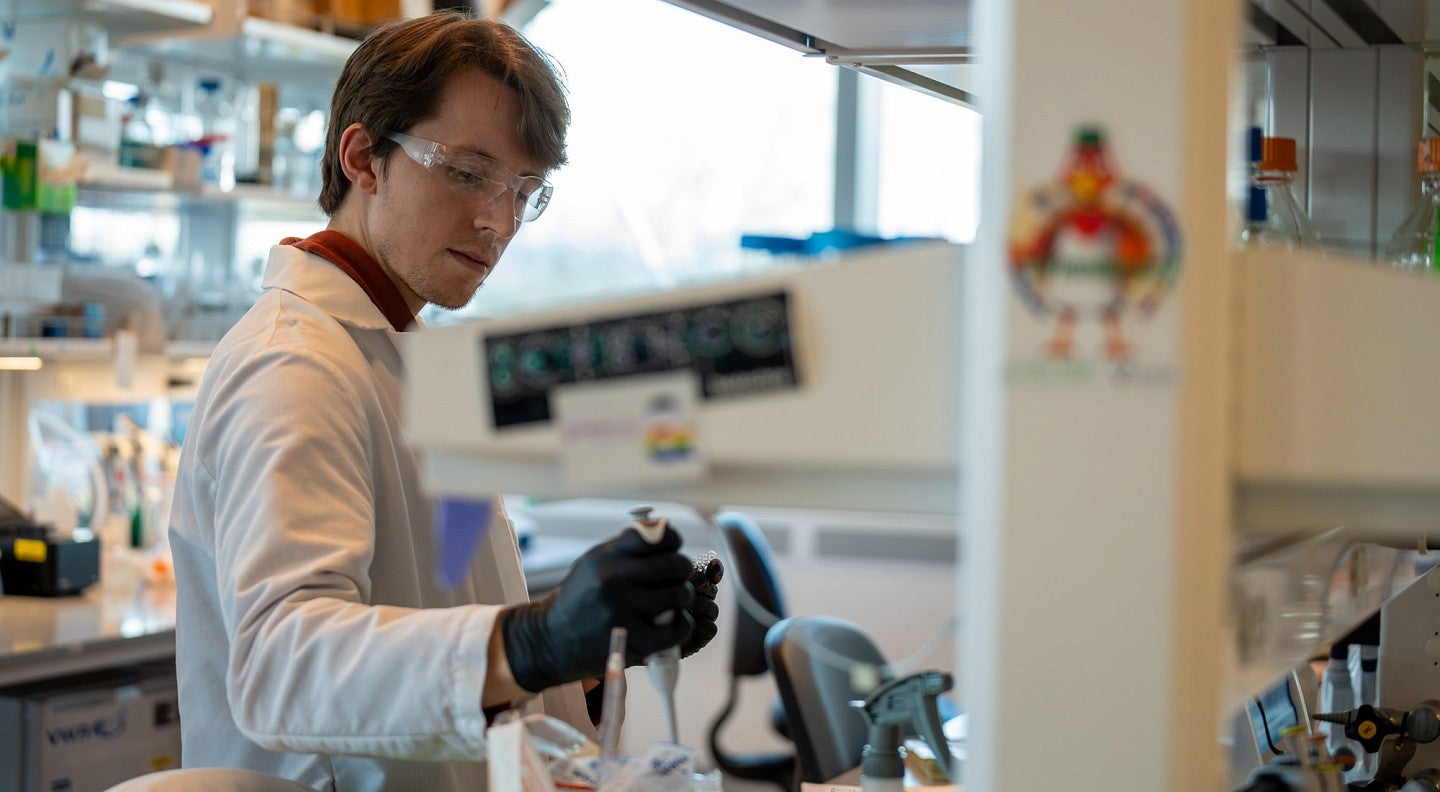
Lundquist College of Business Sparks Start-up Culture
Students and faculty across campus bring new ideas to life thanks to vibrant entrepreneurial spirit
By Ed Dorsch • Photos by Dustin Whitaker• Illustration by David Gill • April 3, 2024
5 min read
When Justin Svendsen signed up for last year’s Oregon Innovation Challenge, he didn’t have an idea for a new business. The University of Oregon graduate student just wanted to learn about entrepreneurship in theory.
The Lundquist College of Business competition for student entrepreneurs quickly helped him put theory into practice. By thinking about a gap in the marketplace that he could address, Svendsen was able to isolate his idea, develop a market plan, and divide his aspirations into achievable milestones.
Today, as Svendsen works on his biochemistry PhD at the Phil and Penny Knight Campus for Accelerating Scientific Impact, he’s also working on a patent for Hydroject, his innovative drug delivery system that could revolutionize antibiotics.

For coaching and inspiration along his journey from science to start-up, Svendsen credits Jeff Sorensen, director of the Lundquist Center for Entrepreneurship.
Says Svendsen: “I didn’t have the idea for Hydroject until Sorensen inspired me to think about how I could apply my background in science to create something novel.”
Starting a new venture is daunting, says Sorensen. But it’s the first step that matters most—not the destination.
“We want to see more shots on goal from across the university,” he says. “We’re here to help launch new products, services, and organizations. Many of those won’t become sustainable, but you’ll learn more by taking a shot than if you never try.”
More students and faculty members are giving their ideas a shot, thanks to a start-up ecosystem centered in the Lundquist College. This support network provides education, mentorship, and community for entrepreneurs from all disciplines. And donors are stepping up to keep the flywheels humming.
Recent leadership gifts from the Cameron family, Nancy and Dave Petrone, David Stern, and other UO donors have boosted joint initiatives that unite the Lundquist College and Knight Campus around innovation. Their contributions will support faculty, student awards, and new entrepreneurs in residence.
The demand for these resources will likely increase along with the number of UO student and faculty start-ups created through the Oregon Innovation Challenge.
Sorensen launched the challenge shortly after starting at the Lundquist College in fall 2022. It’s quickly become the primary platform for inspiring and supporting student-led innovation.
“We want to see more shots on goal from across the university. We’re here to help launch new products, services, and organizations.”
—Jeff Sorensen
Having an entrepreneurial spirit is crucial for career readiness, regardless of your major or professional aspirations, says Bruce Blonigen, Edward Maletis Dean in the Lundquist College of Business. He adds that the college serves many different kinds of ventures and emphasizes collaboration.
“It’s not Shark Tank,” Blonigen says. “We’re working together and supporting each other. Being an entrepreneur can be lonely. We’ll meet you where you are and help you push your ideas toward something viable in the marketplace.”
The challenge welcomed more than two hundred student entrepreneurs to submit their start-up ideas for the inaugural competition in 2022. Sixteen finalists were funded, including an artificial intelligence 3D modeling program, paper manufactured from mushroom farm waste, several clothing brands, healthy workout supplements, and freeze-dried backpacking cuisine.
Hydroject was also a finalist. Svendsen’s venture could save lives and address the growing threat of antimicrobial resistance by delivering antibiotics more precisely. Since penicillin was discovered in 1928, antibiotics have saved countless lives. But overuse has spurred microbes to develop resistance to them.
According to the World Economic Forum, antimicrobial resistance could lead to ten million deaths per year by 2050. Oral antibiotics also wipe out your entire gut biome—like a nuclear bomb in your stomach, Svendsen says.
Hydroject is a conditional drug release system that tricks bacteria into thinking they’re attacking cells when they’re actually dissolving a polymer embedded with antibiotics. Because Hydroject targets pathogens precisely—where they are, only when they’re around, and without affecting the rest of the body—it could help reduce antimicrobial resistance, Svendsen says.

Administered as an ointment, gel, or implant, one application could provide treatment that lasts for days, weeks, or longer.
What sparked Svendsen’s invention? It may have started on the first day of the challenge, he says, when participants gathered for introductions and a freewriting assignment: no wrong answers, no stopping, just let it flow. Then share.
Svendsen credits this fluid state of idea generation for helping hatch Hydroject, a new twist on his work with Marian Hettiaratchi, assistant professor of bioengineering at the Knight Campus. In the Hettiaratchi Lab, chemical and biomedical engineering researchers design biomaterials.
By mulling over his graduate and undergraduate research, Svendsen developed his new idea. But without plans, he soon realized, ideas are just ideas.
The Oregon Innovation Challenge helped him organize the steps to reach incremental goals. For him, planning these tasks and sharing them with others created what he calls a system of accountability—crucial for a busy PhD candidate.
During biweekly four-hour workshops with other challenge participants, Svendsen developed his elevator pitch and a business plan. In addition to Sorensen and Bob Mighell, an entrepreneur in residence at the Lundquist College, he met regularly with attorneys hosted by the challenge to discuss corporations and intellectual property.
At Friday business college events called Startups&Slices, Svendsen learned from guest entrepreneurs. Lens of the Market, a program supported by the Knight Campus and the Office of the Vice President for Research and Innovation, taught him about finances, markets, and funding—the nitty-gritty of business.
Biotechnology companies are already reaching out to partner with Svendsen on Hydroject. Without all the help, he says his discoveries would likely have stayed within the lab.
“As foundational researchers, it’s easy to get caught up in the beauty of the science and new knowledge for the sake of new knowledge,” Svendsen says.
“The Oregon Innovation Challenge helped me take that first step, then look at what’s feasible from a business standpoint. I didn’t know how to start an LLC or what a market analysis was. This process added a layer of realism and helped me explore how research could be useful to everyday life.”
Ed Dorsch, BA ’94 (English, sociology), MA ’99 (journalism), is a contributing editor for Oregon Quarterly.




